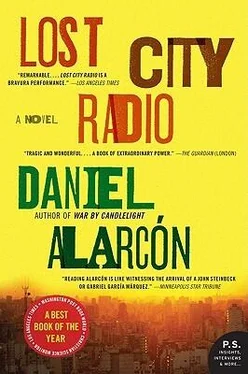Now the women were telling him things that made his head hurt. She’s with your father now, they said, and Victor felt sick to his stomach imagining that dead and empty space. Victor had never known him. His mother told stories, but they were few and vague: your father was from the city; he was an educated man. Not much more, not even a name. But they were together now, the women said, and Victor blinked and wondered what that could mean. The river churned, and his dead mother clung to a rock, the moiling currents poised to take her away, downstream, toward further indignities. A boy approached him and then another, until Victor was surrounded by his friends. Together they waited for the disaster to end, and nothing was said. It was in their faces, in the shifting weight of their bodies: the tension, the despair, the relief that it was not their mother, dead, astride a rock in the river. One of the boys touched him, took him by the shoulder or squeezed his arm. Only a few moments more, Victor thought, and the river would undress her, strip her bare, exposing her skin, the muscles of her back. The men were rushing, but not fast enough. Elijah Manau was among them, Victor’s teacher, his mother’s lover. Victor had watched them walking through the village together, nearly every night since his best friend Nico left, never touching hands until they stepped into the forest. Manau worked alongside the men now, more frantic than the rest, more flushed and helpless. They were the two men of her life. Victor tried to catch Manau’s eye, but couldn’t.
She was dead anyway, he thought, why rush? For a moment, he hated these men, who moved as one to save her body but who had not saved her. They couldn’t feel what he felt. Nico had left 1797 a few months before. Now his mother was gone, too, and the town might as well implode and sink into the earth. She clung to the rock. Nico’s father worked clumsily, glancing up at the river, now back at his stumps and the knot he could not quite tie. He had the rope between his teeth. He’d lost his hands in the war.
“Good for nothing,” Victor muttered to himself. “Useless cripple.” It was the cruelest thought he’d ever had.
The line was nearly set, stretched taut across the river. Who would wade into the current to pull her free? The men had fashioned a raft to carry Victor’s mother’s body back to shore. They organized themselves, and there was Manau, barreling into the water, and the village watched breathless, and Victor knew before it happened that he wouldn’t reach her in time. Manau was up to his chest in its turbid black waters when the river surged, and she let go. Victor never saw her face, only the back of her, his mother set free, her body bobbing and sinking beneath the surface, and then she was gone.
Victor had lied to Norma at the station. He knew why they’d sent him: there was no reason to stay. His mother had prepared it all. She’d wanted him to leave, they said, and it was her instructions that formed the essence of the note he carried to the station. The women of 1797 had sewn the note carefully into the pocket of his pants — there are thieves on the road, they warned him — along with a small sum of money, and a list of all the town’s disappeared. Take it to Norma, they’d said, and he promised he would. He looked at the list, at the dozens of names filling two columns on both sides of a sheet of lined paper. Nico was there, the very last name, but the others he didn’t recognize. One of them was his father, but Victor didn’t know which one. There were so many, strangers mostly, young men who had gone and never returned. Did they suppose Victor could bring them back?
Just to have the names read would count for something. Victor’s voice filling the crowded canteen would be enough. The old spinsters, the men who remained, his classmates — they would celebrate him, as if he had done something extraordinary: conquered a foreign land, crossed a frontier, or subdued a monster. He would read, that would be all; read the names and remind the radio listeners to pray for his mother, who had drowned and been carried by the river to the sea.
This was only three days ago. Since then, his life had acquired a velocity he could scarcely comprehend. Everything was out of order, the contents of his world spilled and artlessly rearranged. Here he was, watching the river boil and steal his mother. Here he was, planting a cross in the sweet-smelling field at the edge of town, a dark-clad throng of mourners behind him at a respectful distance. Here he was, having his head shaved — these were the protocols of mourning — and saying good-bye to his friends, one by one, trying not to cry.
Though his contract was for one more year, the town didn’t have the heart to make Manau stay. He’d been in love. It was what everyone said, and Victor knew it was true. Manau would travel with Victor to the city. He’ll help you, the women told him, and so they left 1797 at dawn, in the back of an old truck, mist still clinging to the hillsides, along a red-earth road cut through the jungle. A small crowd, a half-dozen women, some of his schoolmates, gathered to wish him luck. Victor carried a small, woven bag with a few belongings: a change of clothes, a photograph of the city his mother had saved from a magazine, a bag of seeds. On either side was the forest, a wall of green and black shadows. The truck bounced along the road, through deep ruts pooled with water, and left them in a village named 1793.
Here they waited, but no boat came. The morning grew hot and bright. There was a sign by the river, and a few young men waiting in its shadow. At noon, a small launch came, just a raft with a motor. He would take six, the captain said, but a dozen people pushed their way aboard. The vessel swayed and trembled. Victor sat on his bag and put his head between his knees. There was so much noise: the captain barking out prices, the passengers shouting back. A few people got off, cursing the captain: “Abuse!” a woman yelled. She had a baby in her arms. Then the engine came to life, and everyone pressed together tightly. Victor stayed low while the rest stood; he looked out between legs and baggage at the surface of the black river and the mass of vegetation that curled over the water’s edge. The launch pushed upstream. Victor felt Manau rub his head, but he didn’t look up.
The provincial capital was called 1791. It was an inelegant town of wooden houses clustered around a clapboard church. The bus, they were told, would come that evening or perhaps the next morning. No one could say for sure. “Where can we eat?” Manau asked, and the bespectacled man who sold tickets nodded in the direction of the market.
Victor and Manau wandered among the stalls where the old women were closing up and putting away their wares for the day. They shared a plate of cold noodles and soup. Manau ordered a beer and drank from the bottle. Patriotic songs played over the loudspeaker. “Your mother told me to take care of you,” Manau said. The skin around his eyes was puffy and red.
Victor nodded but said nothing. It seemed for a moment that his teacher was trying to make a joke.
“But who’s going to take care of me?” Manau asked, his voice cracking.
They successfully wasted the day, playing marbles in the plaza, visiting the church to light a candle for his mother. Manau read a newspaper he found beneath a bench. It was damp and yellowed, but only two weeks old. In the late afternoon, they slept a few hours with their backs against the town’s only lamppost, then the bus appeared just before midnight, and 1791 came to life. Women rose to sell silver fish and cornmeal, cigarettes and clear liquor in plastic bags. Small, wiry men carried packages twice their size to and from the bus. The driver and his passengers ate hurriedly, plates of rice steaming in the nighttime chill. Young men smoked and spat, raised their hats at the girls selling tomato sandwiches. Dozens of people gravitated to the bus, were pulled into its orbit. It was loaded in the yellow-tinged darkness, by a group of boys Victor’s age, who clambered atop the roof, tying packages to the rack in an impossible bundle. And then, as soon as it began, it was over: now they were leaving, the doors closing, the bus pulling away with a grunt of the motor. Victor had never seen so much movement. The district capital disappeared, spent by its burst of energy; the women went back to sleep, the men to drinking. In a few moments, the single streetlight had faded, and there was only the heat of the crowded bus and the complaint of the engine.
Читать дальше












